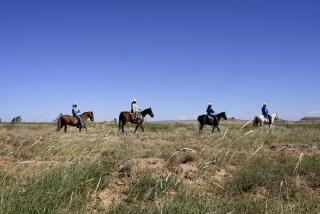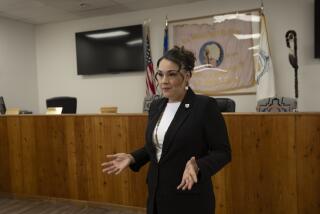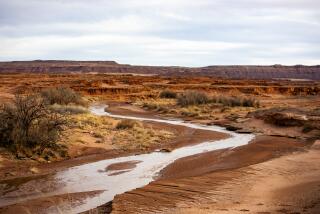Departure From ‘Old Missionary Model’ : Navajo Episcopalians Will Elect Their Own Bishop
- Share via
For the first time, Native American Episcopalians in the Navajo Reservation will elect their own bishop.
The Navajoland Area Mission in Arizona, New Mexico and Utah is the Episcopal Church’s only area mission and, as such, its bishop has historically been appointed by the presiding bishop, the church’s chief official.
But by action at the denomination’s General Convention in Detroit last summer, about 1,200 Navajo Episcopalians living on the reservation will elect their own bishop.
Owanah Anderson, Native American Ministries staff officer at the Episcopal Church Center in New York, said this week that Navajos are pleased that the church has departed from “the old missionary model that was practiced for so many years” and has given Navajos a voice in the policies and processes of the church.
Anderson said indications are that the Navajoland Area Mission will select a bishop at its June convocation and forward the nominee’s name to the presiding bishop for consecration. The area mission has established a search committee, she said, to screen candidates for the post.
Consecration, Anderson said, will follow the normal procedure used for selecting diocesan bishops: approval by a majority of bishops and diocesan “standing committees” across the country.
Until then, Bishop William H. Wolfrum, an associate bishop in Colorado, will serve as interim bishop.
Previously, Bishop Wesley Frensdorff, an assistant bishop in Arizona, had served as interim bishop of Navajoland. But Frensdorff, who served as interim bishop since 1983, was killed in an airplane crash in May.
Among Bishop Wolfrum’s duties in Colorado has been oversight of the Living Waters Indian congregation in Denver.
The proposal to allow Navajos to elect their own bishop was developed over an 18-month period before the convention and was championed by Frensdorff.
At the General Convention in Detroit, opposition to the proposal came from delegates who voiced concern about “risk and precedent,” according to Anderson.
More to Read
Sign up for Essential California
The most important California stories and recommendations in your inbox every morning.
You may occasionally receive promotional content from the Los Angeles Times.










